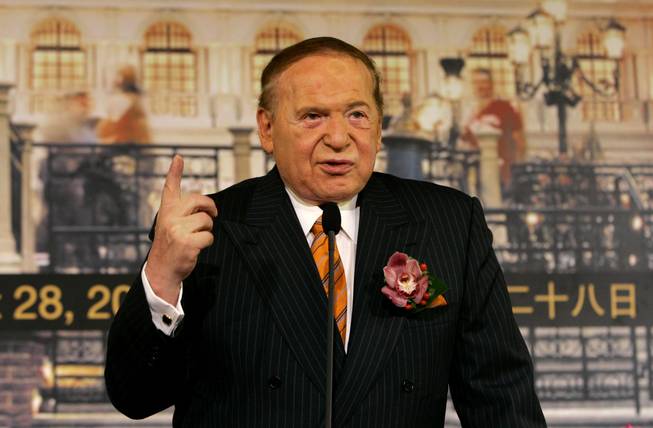
Kin Cheung / AP
Sheldon Adelson, chairman and CEO of Las Vegas Sands Corp., is against online gambling because he doesn’t believe young people can be prevented from making wagers, a spokesman said Wednesday. Adelson is shown here at a news conference for the opening of the Venetian Macao Resort Hotel on Aug. 28, 2007.
Wednesday, Dec. 7, 2011 | 11:43 a.m.
Sheldon Adelson, the world's richest casino executive and chief of the industry's largest publicly traded company, says he opposes online gambling because he doesn't believe available technology is good enough to prevent young people from making wagers on the Internet, a spokesman said Wednesday.
Adelson's opposition is a personal viewpoint, not a formal stance taken by the company that runs casino-resorts in Las Vegas, Macau, Singapore and Bethlehem, Pa., Las Vegas Sands spokesman Ron Reese said.
Reese says Adelson hasn't talked with the company's board about his position, and the board hasn't formally decided a strategy on online gambling.
"It's a personal observation of concerns about technology," Reese said.
The opposition comes as other operators, including Caesars Entertainment Corp. and MGM Resorts International, have backed an industry push to legalize online poker and let established casinos offer it in the United States. Poker, which involves elements of skill and luck, has been illegal online for real money since a 2006 law forbade operators from running games by preventing financial institutions from processing funds for most online wagering.
The casino industry has never had consensus on what it wants, but its top lobby has moved from a neutral stance to actively pursuing federal legislation that would allow for legalization and regulation of online poker.
Frank Fahrenkopf, CEO of the American Gaming Association, said he met with Adelson on Monday and Adelson told him he'll oppose legislation to legalize online poker in the United States.
"Sheldon has long had concerns about this issue, and it is perfectly within his right to make this decision," Fahrenkopf said in a statement. "However, the AGA, at the direction of our board of directors, will continue to support federal legislation to allow states to license and regulate online poker."
The industry is not seeking to legalize other games like craps, blackjack and slots online. Those games are different because players wager against the house. In poker, players wager against each other and operators take a fee from each pot in exchange for hosting the game.
The issue of online poker has heated up among players and casino executives in the past 12 months. U.S. Senate Majority Leader last year touted a plan to legalize poker that fell short without legislation being introduced. In April, three top online operators who offered online poker in defiance of the law had their sites seized and executives indicted by the U.S. Justice Department, accused of financial crimes including fraud and money laundering for disguising payments for gambling funds as transactions for things like flowers and golf balls.
After the indictments, the estimated $6 billion U.S. online poker market essentially crumbled overnight, leaving many players unable to access funds in online poker bankrolls.
With the top poker websites out of the country, the casino association became more vocal in urging lawmakers to close loopholes and craft better regulations.
Fahrenkopf said the association wants federal legislation that allows states to decide whether to offer poker to its residents, keeps kids from gambling online and lets law enforcement shut down illegal operators.
AP Entertainment Writer Lynn Elber contributed to this report, which contains biographical material written by former AP staffer Cadonna M. Peyton.

Join the Discussion:
Check this out for a full explanation of our conversion to the LiveFyre commenting system and instructions on how to sign up for an account.
Full comments policy